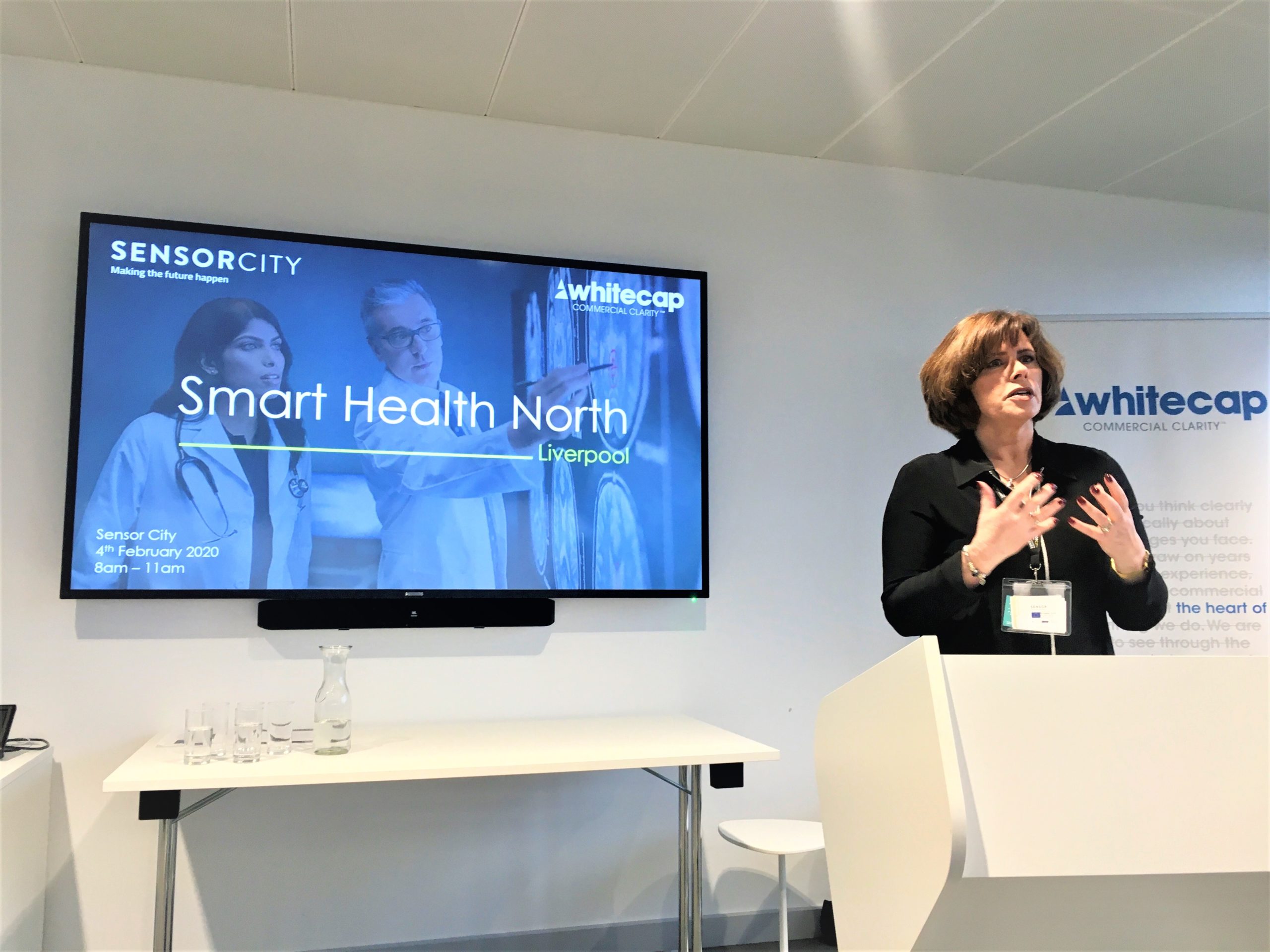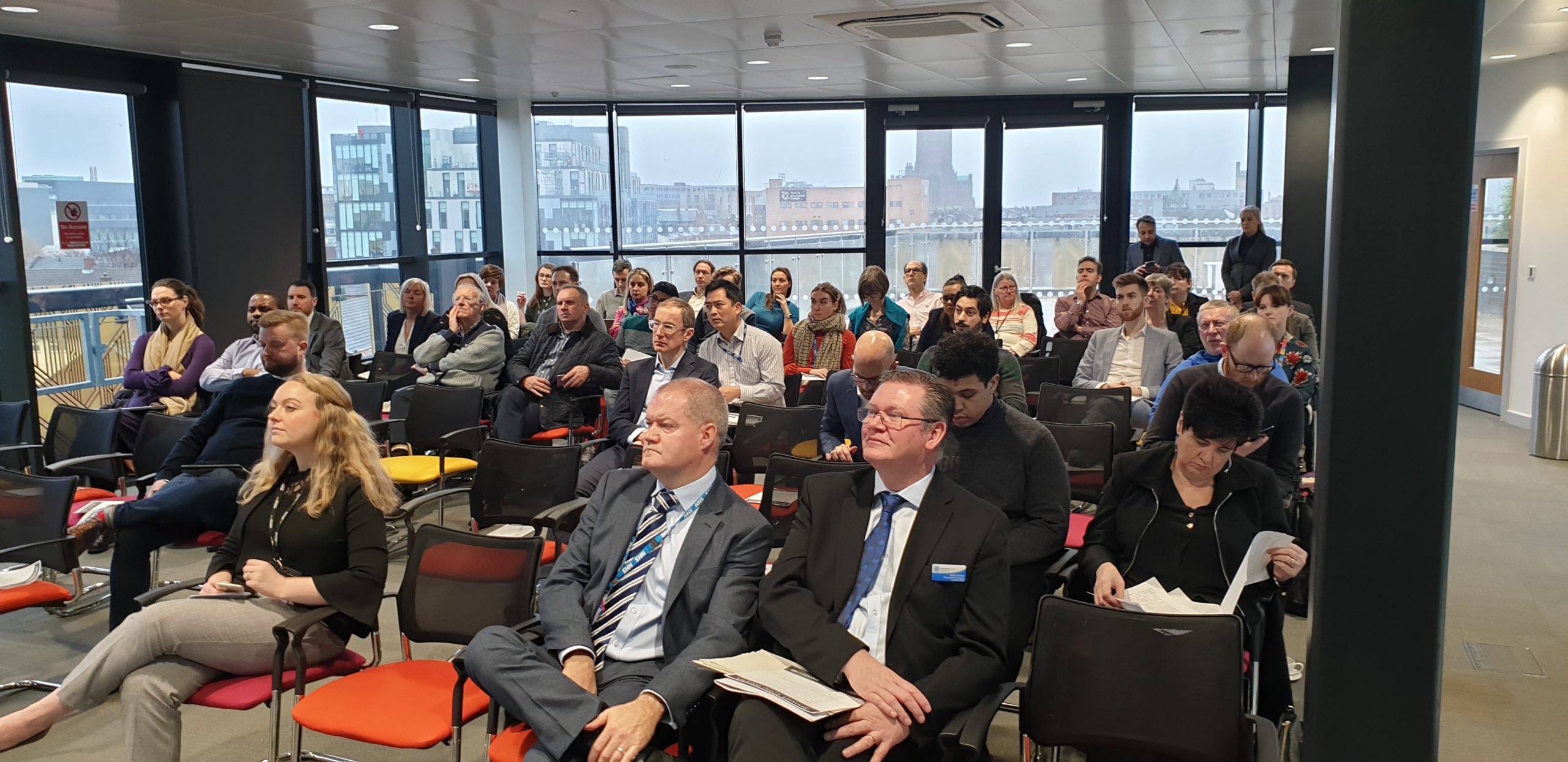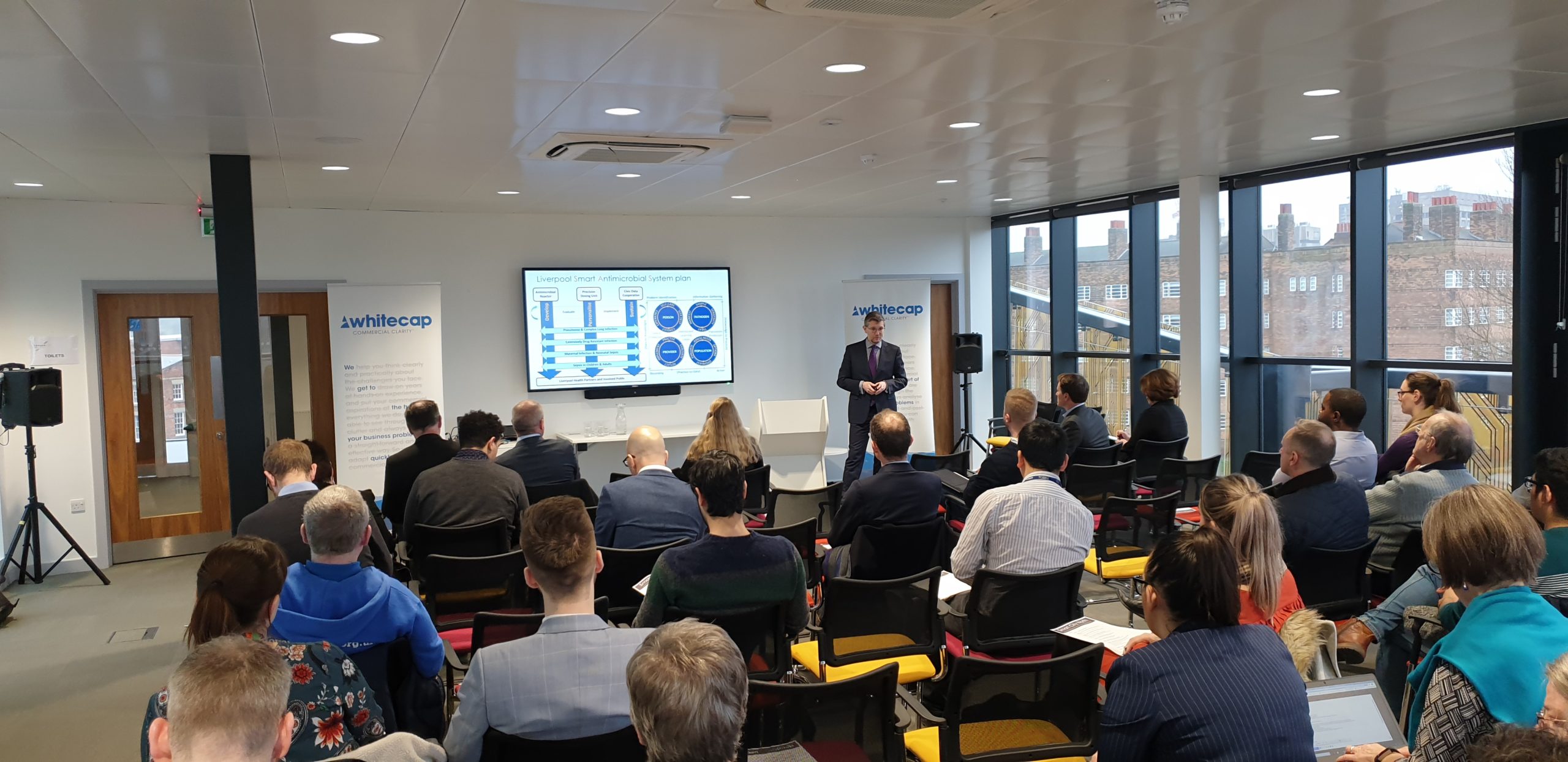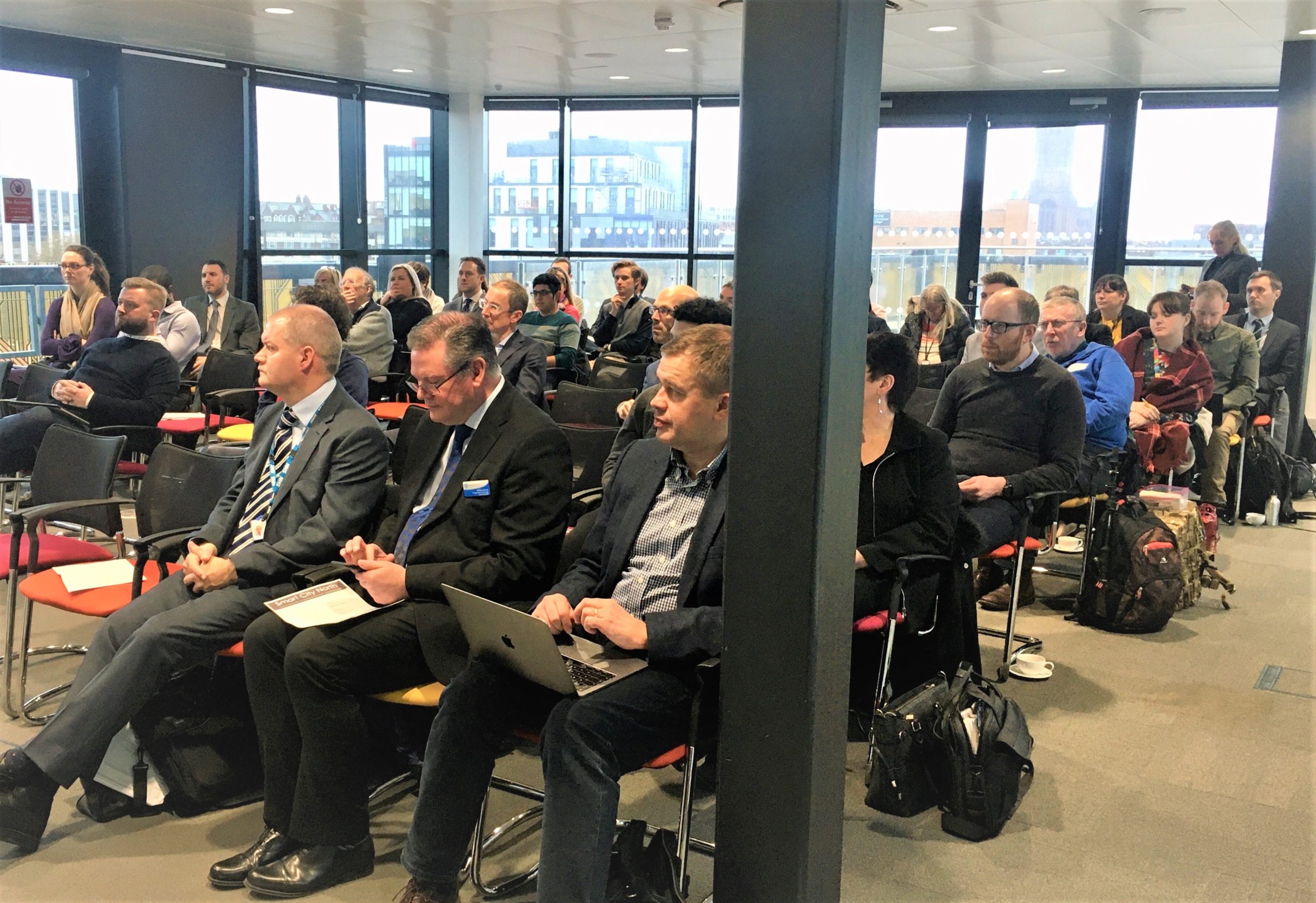The event was kicked off by Dr Joanne Phoenix, Interim Executive Director, Sensor City, who provided an overview of the Internet of Medical Things and how Sensor City is getting involved.
Joanne outlined the importance of smart cities and health across the north, and reiterated Sensor City’s effort to build a community and support value driven healthcare, delivering better healthcare in the community.
In regards to Smart Health / MedTech in LCR Joanne provided the following insights:
- Cities play a growing role in improving the health of the general public.
- Improve regional standards in healthcare, education, industry and the environment.
- LCR key growth sectors including Health & Life Sciences, Digital & Creative and Innovation.
- LCR Health & Life Sciences employs over 6,000 people and is estimated to delivery products and services worth> £1.7bn/yr contributing £300m in GVA.
As for Smart Healthcare and Internet of Medical Things (IOMT) Joanne stated that:
- Arguably the biggest opportunity for Smart Cities lies in healthcare, more specifically IoMT.
- IoMT market will reach $137b with 3.7m connected devices worldwide by 2021.
- IoT in healthcare enables machine-to-machine communication, information exchange and data movement that makes healthcare service delivery effective.
- New technology and networks are transforming the way we gather and use data.

Next up was Stefan Haase, Director, Whitecap Consulting, who provide an overview of the global HealthTech market.
Stefan highlighted the following key global HealthTech trends, investment activity and technology trends:
- The global digital health market is expected to reach a size of $206 billion in 2020, driven in particular by the mobile and wireless HealthTech market.
- $8.3bn increase in HealthTech M&A activity recorded in first half of 2019 (11% more than in 2H 2018)
- $26.9bn invested in healthcare companies globally compared to $26.5bn in 1H 2018.
- There are currently 38 VC-backed digital health unicorns worldwide, worth a combined total of $90.7 billion.
- Key trends in HealthTech are tracking, monitoring and patient engagement solutions are attracting attention, as preventative medicine is prioritised to avoid costly later-stage interventions.
- HealthTech technologies help to improve health outcomes, be it through the promotion of healthy living, disease prevention and diagnosis or treatment and rehabilitation.
- These technologies include classic digitization solutions, the use of biotechnology, big data approaches or the use of artificial intelligence (AI) in healthcare research and development or delivery.
Key predictions:
- Value based care progresses as outcomes focus globalises
- AI explodes across healthcare & life sciences post flagship use cases yield positive results
- Digital health will come of age with an increased focus on individual care
- Asia becomes the new local innovation focus for global drug and device OEMs
- Healthcare data analytics shifts from Big Data to meaningful small data by hospital speciality
- Healthcare will be a dominant vertical in voice applications
- Blockchain moves from hype to reality with further commercial implications
- Innovative private insurance models shake up healthcare payer industry

The first Healthcare specialist to present Professor Iain Buchan, Programme Director for Digital Strategy and Partnerships, Liverpool Health Partners who spoke on Civic Data Trust “Regional data”, a programme that brings together expertise, facilities and technology to make complicated health data easier to use and to provide value for money and effectiveness in services.
He provided the follow key insights:
- Needs a cooperative approach across the health system.
- Significant global healthcare market failures
- Profound health innovation pressures
Liverpool Health Partners brings together expertise, facilities and technology to make complicated health data easier to use and to provide value for money and effectiveness in services. Projects are aimed at advancing medical knowledge and improving services for individual patients and families. This includes support for the LHP priority areas.
Currently, the Informatics and Digital Programme is working with Liverpool City Region Combined Authority on developing the Liverpool City Region Civic Data Trust, to help understand the key determinants of health in the region. This extends to using early intervention and preventative approaches before disease develops. It is also important to understand and address the wider problems relating to inequalities in healthcare provision.
Its partners strictly adhere to the ethical principles for informatics projects defined by the Medical Research Council. These principles reflect governed data access processes in the NHSA and its constituent Academic Health Science Networks.

Next up was Philip Jennings, Medical Director, Innovation Agency who presented on Connected Health Cities “Data and patient care”
Connected Health Cities (CHCs) will improve health services for patients in North England. By making better use of under-used information and applying the latest technology we can enhance local health needs. By working with patients will be ensure our research is relevant, effective and has a real impact on public health
Philip stated that:
- Complex chronic diseases demand sophisticated, clinically-designed analytics – the devil is in the detail
- CHC is seeking to leverage greater value and insight from routine administrative data (and then beyond)
- The approach is transferrable, scalable and provides a model for other chronic conditions
- Complex array of variables (patient, place, provider)
- There are opportunities for digital innovations (visualization, geospacial mapping, data mining, machine learning, predictive analytics)

This was followed by Andy Cairns, Programme Manager at the Innovation Agency / Academic Health Science Network for the North West Coast, who presented on Health MATTERS “Innovation support”.
The Innovation Agency /AHSN provides funding and support programme for businesses developing products or services within the health and care sectors, based within Liverpool City Region.
Health Innovation Exchange programme achievements over the past 3 years:
- Supported 90 SMEs
- £25m new investments
- £2.5m new contracts
- 73 new jobs
North West Coast region stats:
- 242 SMEs supported
- 122 Real world validations
- 71 jobs created
- 6 jobs secured for team
Liverpool City Region context:
- 70 SMEs supported
- 45 Real world validations
- 3 one day sessions on “Excel in Health” to provide some of the knowledge you need to work in Health and Social Care sector.

The final presentation was from David Champeaux, the Cognitive Director, Healthcare Solutions for IPsoft who spoke about “The art of the possible”, when bringing innovation and a human touch to enable people to live healthy lives in their homes.
The event was concluded with a Panel discussion and short pitches from:
- Alder Hey Innovation – Sophie Johnson, Innovation Consultant “Challenges and Innovation Solutions”
- Imagin3D – Andy Sands, “Using technology to educate healthcare professional of the future”
KRTS International – Cath Kerr, Co-founder “Mental health in the workplace” - FIT4RRI – Mary Jane Monaghan “Ethics of health and social care technology and innovation”
- EITC (Everton in the Community) – Mike Salla “Health and well-being in the Community”
The next event in the series will be hosted on the 12th May 2020 and focus on Smart Data and Security.